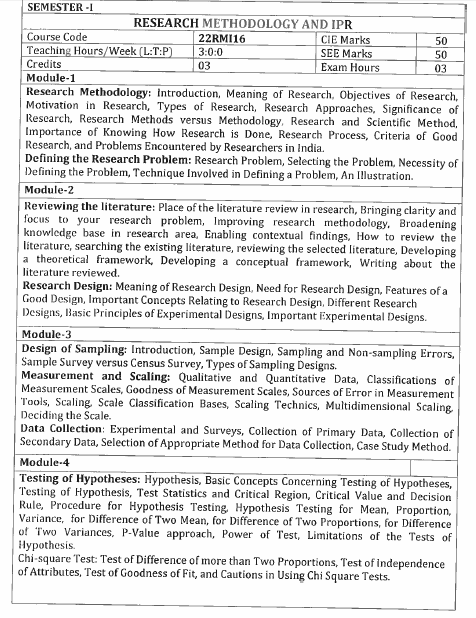Research Methodology and IPR
FOR UG: RESEARCH METHODOLOGY & IPR [BRMK557] : Link
For PG:
Syllabus: https://vtu.ac.in/pdf/cbcs/pg/2022/rmipsyll.pdf
Book For Reading: https://ccsuniversity.ac.in/bridge-library/pdf/Research-Methodology-CR-Kothari.pdf
Ranjeet Kumar : https://drive.google.com/file/d/0B6ERgueQENegMHlvYU9oTVBxcG8/preview?resourcekey=0--FjIWAmU7MbCtQ2-qR84DQ
Introduction
Research Methodology:
Research methodology refers to the systematic and logical approach adopted by researchers to conduct their research. It involves the selection of a research problem, the formulation of research questions or hypotheses, the design of a research study, the collection and analysis of data, and the interpretation of results.
A research methodology typically includes the following steps:
Formulation of research problem: Researchers identify a problem or an area of interest for investigation.
Literature review: Researchers gather and analyze existing literature on the research topic to identify research gaps, establish a research problem and develop a hypothesis.
Research design: Researchers develop a research design that describes the methods and procedures that will be used to collect data.
Data collection: Researchers collect data using various techniques such as surveys, interviews, focus groups, experiments, and observation.
Data analysis: Researchers analyze the collected data using statistical or other analytical techniques to draw conclusions and support or reject their hypotheses.
Interpretation of results: Researchers interpret the results and draw conclusions about the research problem and research questions.
Communication of findings: Researchers communicate their findings through research reports, journal articles, and conference presentations.
Intellectual Property Rights (IPR):
Intellectual Property Rights (IPR) refer to the legal rights granted to creators and innovators over their intellectual property, which includes inventions, literary and artistic works, designs, and symbols.
The purpose of IPR is to encourage and protect creativity and innovation by granting exclusive rights to the creators and innovators to use and exploit their intellectual property.
Types of IPR include:
Patents: These are exclusive rights granted to inventors for new and useful inventions.
Copyrights: These are exclusive rights granted to creators of original literary, artistic, and musical works.
Trademarks: These are exclusive rights granted to individuals or companies for distinctive signs, symbols, and logos that identify their products or services.
Trade secrets: These are confidential information, knowledge, or practices that are not generally known and provide a competitive advantage to a company.
Industrial designs: These are exclusive rights granted to creators of aesthetic and functional designs of products.
IPR play a significant role in promoting innovation and creativity by providing incentives to creators and innovators to invest time and resources in developing their ideas. They also provide legal protection against infringement and unauthorized use of intellectual property.
MODULE 1: MOD1_GURURAJ_CSE_PPT



No comments:
Post a Comment